Iran Preparing To Deal With Omicron, Expected To Hit Next Week
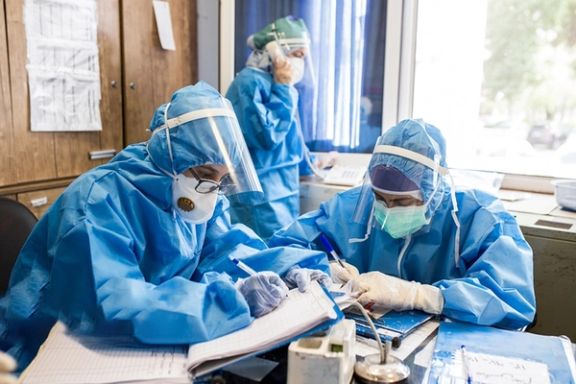
Iran has begun preparations to deal with the Omicron Covid-19 variant a top health official said Wednesday and added that its impact will be felt next week.

Iran has begun preparations to deal with the Omicron Covid-19 variant a top health official said Wednesday and added that its impact will be felt next week.
Nader Tavakoli, the deputy of the coronavirus task force in Tehran said hospitals and clinics are on alert and are expanding emergency room services in anticipation of more infections with Omicron.
Tavakoli said that because of the much faster infection rate of this variant, hospitals will set up quick examination facilities outside emergency rooms. He added that so far there is no uptick in patient visitations because the Omicron virus “has entered the country only recently”.
Iran confirmed the first Omicron case on Sunday, December 19, saying that two more suspected cases were under investigation. Tavakoli said that there are not sufficient kits to test every suspected case.
Iran has reportedly vaccinated about 60 percent of its 84-million population with two doses of Covid vaccines, mainly the Chinese-made Sinopharm and the Russian Sputnik-V.
Although fatal cases have been decreasing during the past few weeks due to vaccination, the Omicron may push the death rate to a new peak in the upcoming cold winter months. A new study has indicated that Sinopharm and Sputnik vaccines are weaker against Omicron.
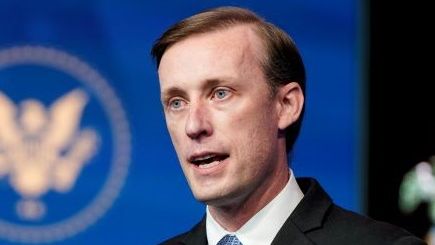
Visiting US National Security Adviser Jake Sullivan and Israeli Prime Minister Naftali Bennett discussed Iran and the ongoing nuclear talks in a meeting on Wednesday.
Bennett's office, which issued video of the meeting, said in a statement that the two discussed Iran and world powers' efforts to renew the 2015 nuclear deal.
"What happens in Vienna has profound ramifications for the stability of the Middle East and the security of Israel for the upcoming years," Bennett told Sullivan, referring to the site of the negotiations with Iran.
Israel is not a party to those talks. It has long hinted that, should it deem diplomacy a dead end, it could resort to military force to prevent Iran gaining the means to make a bomb.
Iran denies seeking nuclear weapons.
Sullivan said he had been sent to Israel by President Joe Biden "because at a critical juncture for both our countries on a major set of security issues, it's important that we sit together and develop a common strategy, a common outlook".
Top-selling Israeli newspaper Yedioth Ahronoth ran an interview with the country's incoming air force chief in which he was asked if his corps was poised to attack Iran "tomorrow", if required. "Yes," responded Major-General Tomer Bar.
Reuters report
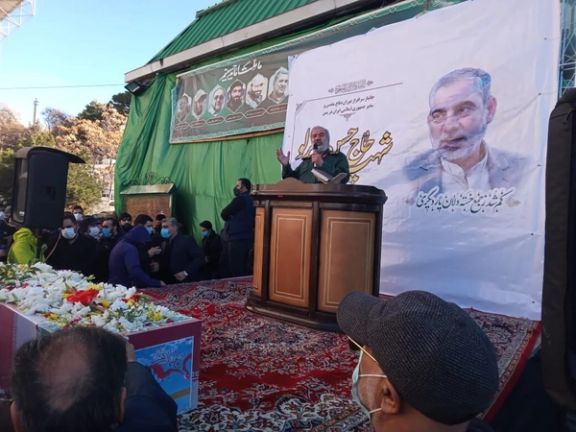
The Saudi-led coalition fighting in Yemen has rejected Iranian accusations that it delayed arrangements for the evacuation of Tehran’s envoy from Sanaa.
The coalition said on Wednesday it had helped get the sick ambassador out of the country before he died.
Iran said on Tuesday that Hasan Irloo (Irlu), its ambassador to Houthi-run north Yemen, had died of Covid-19 after his evacuation from Yemen, and accused Saudi Arabia of delaying his departure from the capital, Sanaa.
The coalition, which has been fighting the Iran-aligned Houthi movement since early 2015, said in a statement it had facilitated Irloo's repatriation and had arranged for an Iraqi medical plane to fly him from Sanaa to Basra in Iraq.
It said it began facilitating Irloo's transfer from Sanaa on humanitarian grounds, considering mediation from Oman and Iraq, within 48 hours of being informed of his health condition.
It had provided permits and logistical support for the Iraqi air force C-130 medical evacuation plane that took Irloo out, coalition spokesperson Turki al-Malki said.
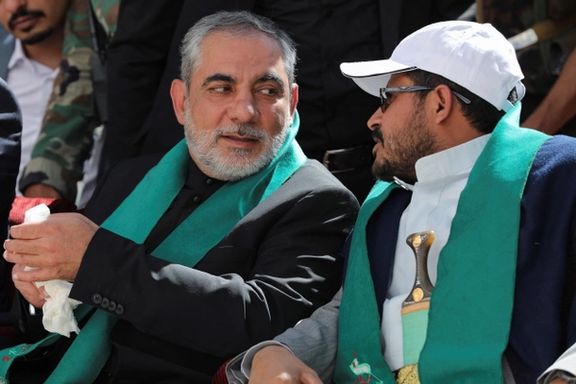
The coalition did not say in the statement what medical condition Irloo had been suffering from. He was buried in Iran on Wednesday.
Fars news agency affiliated with Iran’s Revolutionary Guard repeated Wednesday that Saudi Arabia’s “delay caused the martyrdom” of Irloo, quoting the Houthi foreign minister Hisham Sharaf.
In his funeral ceremony on Wednesday, deputy commander of the IRGC, Ali Fadavi, portrayed Irloo as a longtime “fighter in the resistance front”, a term the Islamic Republic uses to describe its allies and proxies in the region. He accused the United States and “its allies” of delaying Irloo’s evacuation, saying that when he was finally brought to Iran he had been suffering from Covid “for a long time”.
Last week controversy ensued after a Wall Street Journal report said that the Houthis had asked Iran to withdraw Irloo. Both Iran and the Houthi leadership denied the report, insisting that the ambassador suffered from Covid and needed to receive medical attention in Iran.
But speculations on Iranian social media continued that Irloo had been perhaps killed or injured in Yemen and both Tehran and Riyadh preferred to say he was evacuated for medical reasons. Saudi Arabia has been conducting a fierce air campaign on suspected military and Iran-related targets in and around Sanaa.
Saudi Arabia and Iran, the region's Sunni Muslim and Shi'ite powerhouses, are bitter rivals but they launched direct talks this year as global powers try to salvage a nuclear pact with Iran and as UN-led efforts to end the Yemen war have stalled.
The bilateral talks have not resulted in any breakthrough, Iran said on Sunday. The two countries severed diplomatic ties in January 2016, after mobs in Iran attacked and ransacked Saudi diplomatic missions.
Last December, the US Treasury blacklisted Irloo and described him as an official of Iran's elite Quds Force, the overseas arm of Iran's Revolutionary Guards and a pillar of Iranian efforts to project power in Yemen, Syria and elsewhere.
Two Yemeni political sources and a foreign source have said Irloo had recently kept a low profile due to illness and political tension.
With reporting by Reuters
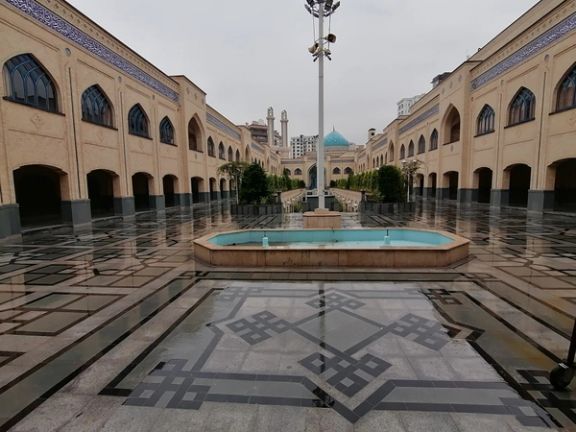
Referring to large budget increases next year for Shiite seminaries in Iran, a prominent cleric has criticized dependence of religious centers on state money.
"Seminaries must use the money coming from people who pay willingly. Seminaries must be independent [from the government]," Ayatollah Mostafa Mohaghegh-Damad, a professor of Islamic law at Shahid Beheshti University of Tehran, said in a speech on a book dedicated to the Centenary of the Qom Seminary. "Today one of the problems of the seminary is its dependence on the government."
The Qom Seminary, established by Sheikh Abdul-Karim Haeri-Yazdi in 1922, is the largest Shiite seminary (hawza) in Iran with over 75,000 students. Seminaries were self-funded before the Islamic Revolution but like many other religious institutions, they now receive huge sums annually from the government.
In his speech, Mohaghegh-Damad, a moderate religious figure and a member of Iran's Science Academy, cited examples of prominent Shiite religious leaders who have emphasized the importance of separating religion from politics.
The budget allocated to religious institutions in the first budget bill presented to Parliament by President Ebrahim Raisi recently is noticeably higher in comparison with the previous year's budget – at least on those instances where clear figures have been noted.
For instance, the budget proposed for the Seminaries Services Center has doubled. The Seminaries Services Center is to receive 2.8 trillion rials which is higher than the 2,157 trillion rials allocated to the Department of Environment and many other government bodies including the Crisis Management Headquarters. The Center also receives funding from the Supreme Leader's office.
Supreme Leader Ali Khamenei ordered the Seminaries Services Center to be established in 1991 to provide housing assistance, health insurance, and similar services to seminary students, who are the future clerics and whose loyalty is important for the regime.
Critics say that in some cases the budgets proposed for government bodies and state entities is difficult to calculate from what is discernible in the budget bill, which does not provide sufficient details.
The government says its budget bill is based on restrictive monetary policies.
Based on the details provided in the bill, the budget of the Islamic Propaganda Organization itself has increased by 43% in comparison with the previous year and reached 11.7 trillion rials. Many other large and small institutions have also been allocated huge increases of up to 124%.
The budget allocated to Al-Mustafa International University of Qom, the Islamic Propaganda Bureau of the Qom Seminary, and the Artistic School of the Islamic Propaganda Organization have not been announced this year.
The Al-Mustafa International University, a state-funded university-style Shiite seminary with branches in many countries, received a budget nearly 5 trillion rials last year, or around $100 million based on the official exchange rate that was applicable at the time. This is higher than the budget of any university in Iran.
The Al-Mustafa University pays for hundreds of foreign students from China to Africa and Latin America who come to study and then return to spread Iranian Shiite teachings in their countries.

The number of women in Iran who sell their hair to get some money and be able to survive amid increasing economic hardship is increasing in the country.
Iranian daily Khorasan published an article on Tuesday bawed on inteviews with women who are active in the hair trade.
Beauty salon owners and barbers are the main buyers of hair that is mainly used for wigs and extensions.
Almost all of the clients sell their hair due to financial difficulties, a barber was quoted as saying.
According to the article, the hair sellers are from all walks of life and in all ages, from 10-year-old adolescents to elderly women, but the majority are young girls from poor families. They are usually in dire need to pay bills or replace their broken phones.
According to an earlier report about selling hair in Iran, the price for someone’s shorn hair can be from $10 to $50 depending on the length, type and volume.
Three years of high inflation rising to 45 percent in recent months has impoverished many middle class families, who sometimes cannot even afford meat and dairy produxts any longer.
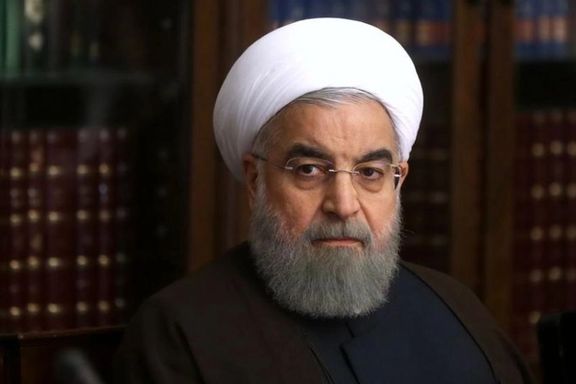
A leading regime insider says former President Hassan Rouhani wanted to resign after the US pull-out from the 2015 nuclear deal, but the Supreme Leader refused.
Hassan Marashi, the secretary general of the centrist Executives of Construction Party told the economic website Eghtesad News on Tuesday that Rouhani should have resigned as his government was formed based on the idea of holding a dialogue with the United States, but Iran's foreign policy needed to change track in 2018 after Donald Trump left the JCPOA.
"When diplomacy failed, there was no reason for Iran continuing diplomacy," Marashi said. Meanwhile,Marashi acknowledged that the pull-out by Trump was a hard blow to the Rouhani administration. It also emboldened Rouhani's political rivals to start attacking him.
"I told the Supreme Leader that we needed to change course after Trump's pull-out, and then I heard that Rouhani had suggested that he should resign, but the leader did not deem the decision fit for the situation," Marashi added.
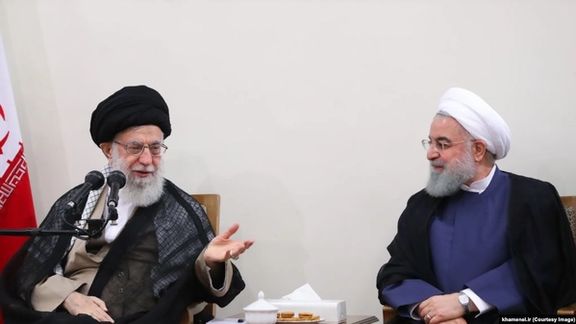
In another development, while Rouhani's hardliners have been demanding to put him on trial for his failure to sort out the country's economic and foreign relations problems during his presidency, another reformist figure has suggested that he should welcome a trial.
"I would have welcomed the trial if I were him, " said Mohammad Ali Abtahi the chief of staff of former President Mohammad Khatami in an interview with the Iranian Labour News Agency ILNA on Tuesday, adding that the call for Rouhani's trial is a blame game to divert attention from the new government's failure in solving the country's economic problems.
Abtahi added that the lawmakers who found their way to the parliament with revolutionary slogans have not been able to bring about any positive change and the economic crisis has been deepening on daily basis during the past six months.
"They have also not managed to solve the problem the issue of nuclear negotiations and the markets are still waiting for a positive sign from Vienna, and this is against the Majles and the administration's claims about separating the fate of the country's economy from what happens in the course of the negotiations,” Abtahi argued.
Speaking of responsibility about the current situation addressed both to President Rouhani and former Parliament Speaker Ali Larijani, former government spokesman Ali Rabiei, who is a swell informed veteran intelligence ministry official, summarized what Iran's hardliners call "the current situation"in his Telegram Channel and on the proreform Fararu news website.
Rabiei highlighted Iran's current situation as "the undesirable situation of economic hardships that make life difficult for decent Iranians, an unprecedented inflation worsened by the instability of Iran’s currency and other markets since 2018, widespread poverty that defies all the revolutionary slogans, the social fatigue and insecurity felt by various walks of life in Iran, a rise in emigration by elite Iranians, as well as a decline in respect for revolutionary values."
Rabiei also pointed out that decline in political participation is so bad “that in a city such as Tehran only around 7 percent of eligible voters went to the polls in the 2020 parliamentary election and in some cities the number of votes cast for the winner was barely higher than the number of those who worked at the polling station."
"Add to that the loss of Iran's geopolitical advantage, having no place in the international economy and depriving the nation of the opportunities international economy and modern technology can offer," Rabiei stressed.